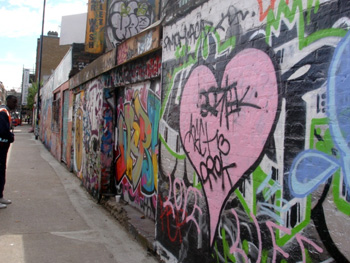Community Payback
What is Community Payback?
Community Payback is a punishment where offenders 'pay back' the community for their crimes. The scheme is delivered by London Community Rehabilitation Company and offenders are supervised to conduct demanding, physical work in their community. Magistrates and Judges can order offenders to do between 40 hours and 300 hours of Community Payback. Offenders are expected to undertake a minimum of six hours per week. Offenders wear orange jackets marked 'Community Payback', so local people can see they are paying back for their crimes.
Local people can have their say on which Community Payback projects are tackled.
Community Payback projects must:
- Reduce crime and fear of crime
- Be identified by local communities as a priority
- Be visible to local communities
- Improve quality of life for the community
Examples of work completed include:
- Graffiti removal
- Street clean-ups
- Ground clearance
- Recycling projects
- Building maintenance
- Improvements to park and community facilities
- Environmental preservation programmes
- Landscaping and gardening projects
- Painting and decorating in community centres and meeting places
Graffiti removal project results below:


The work benefits local schools, faith grounds, charities and community organisations. Although the Probation Service provides the free labour, the community group or charity will be asked to provide materials for the job such as paint, plants or building materials.
How does it work?
Community Payback takes place in all London boroughs. In Tower Hamlets it is a partnership between the Council, London Community Rehabilitation Company and the Metropolitan Police. The London Community Rehabilitation Company does a health and safety overview, provides the offenders, completes the risk assessment and manages the work projects.
The main priority is the protection of the public. Each offender is carefully assessed before they are assigned to a project of work. This assessment looks at an offender's criminal and personal history, the crimes they committed and the risk they pose to the public. Offenders will not carry out Community Payback if they are considered a risk to the public.
When carrying out Community Payback work, offenders are transported to and from the project, work in small teams and are supervised by fully-trained supervisors.
The Council provides waste removal, transport, storage facilities and, sometimes, equipment. Police Community Support Officers (PCSOs) and housing caretakers may support Supervisors on site. Many projects are nominated by front line officers in the Street Care or Tower Hamlets Enforcement Officers (THEOs). The Police Safer neighbourhoods Teams help the community to nominate Community Payback projects.
Community Payback listens to Tower Hamlets residents
We want you to have your say about the work Community Payback does in your community. If you think there is something in your area which Community Payback can help with please contact your Safer Neighbourhoods Policing Team.